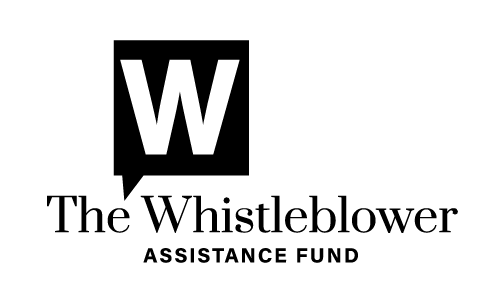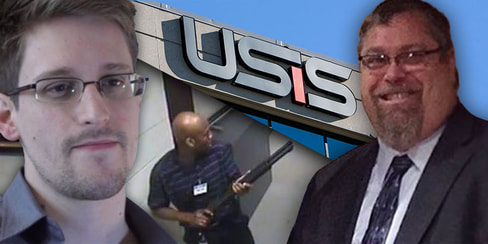|
Feb 25, 2020
Interview with Blake Percival - A Whistleblower's Story |
 Blake Percival Blake Percival
Feb 25, 2020 What's Next Aileen? Blake Percival "Holding Onto Integrity And Paying The Price" A Whistleblower's Story 
THE WHISTLEBLOWER ASSISTANCE FUND
Purpose: The Whistleblower Assistance Fund is being created to address a need within the whistleblower community for an avenue to obtain monetary assistance. Many times, once whistleblowers have come forward, they encounter financial hardships because of their whistleblower action due to no fault of their own. This fund will offer financial gifts with no strings attached to deserving whistleblowers. It will also serve to recognize whistleblowers, educate law firms, legal professionals, the public, and whistleblowers about the assistance this fund can offer. The Whistleblower Assistance Fund is a Federal 501(c)3 Non-Profit Founded in 2020 by National Security Threat Whistleblower Blake Percival. EIN: 84-4229895 Mailing Address For Donations: The Whistleblower Assistance Fund, Inc. PO Box 252 Wetumpka, Al 36092 
JL Wilkinson Consulting
(706) 518-2116 Specializing In Personal Representation Booking Agent, Management, Political Consulting, PR/Marketing, Fundraising, Business Development https://www.jlwilkinsonconsulting.com |
“Blake Percival is one of the most important whistleblowers in recent history,” Attorney Larry Golston says. “We as a country are safer because of what he did.” Blake Percival was born in Panama City, Florida where he was raised in a traditional Southern home.He graduated from High School in Montgomery, Alabama in 1984 and served 6 years in the U.S. Army where he was Honorably discharged at the rank of Sergeant in 1992. He then worked as a Police officer in West Virginia and Alabama. Blake is a graduate of the West Virginia State Police Academy, The Montgomery Police Academy, The Alabama Judicial College, and he holds a Bachelor of Arts Degree from Bluefield State College in Bluefield, WV. From 2001-2011, Blake worked for USIS, also known as US Investigations Services, where he rose through the ranks to the position of Director. USIS was a Company contracted by the government to conduct National Security Clearance Background Investigations on prospective and current Federal employees. Blake became a Whistleblower in 7/2011 when he exposed that USIS was billing the U.S. Government for background investigations that allegedly had not been properly reviewed. Among the clearances allegedly not properly reviewed by USIS were NSA Leaker Edward Snowden and Aaron Alexis who shot and killed 12 people at the Washington Navy Yard. For 4 1⁄2 years, Blake was not allowed to talk about the case, but once it settled in 12/2015 that changed, and he was featured on the front page of The Washington Post as the Whistleblower. Blake is now sharing his experience in his new book, “Holding on to Integrity and Paying the Price – A Whistleblower’s Story”, being released on March 2, 2020. Blake is the founder of The Whistleblower Assistance Fund and donates a portion of the books’ proceeds to help future Whistleblowers with financial needs during the legal process which can take years. Blake now spends his time speaking regularly throughout the United States on leadership, integrity, business ethics, faith, motivation and is considered a leading authority on the vetting process and investigations. Blake was honored by being named a Giraffe Hero in 2017, for sticking his neck out for the common good. |
 Blake Percival (right) exposed USIS “dumping” practices. USIS performed background checks on Edward Snowden (left) and Washington Navy Yard shooter Aaron Alexis (center)
Blake Percival (right) exposed USIS “dumping” practices. USIS performed background checks on Edward Snowden (left) and Washington Navy Yard shooter Aaron Alexis (center)
How an Alabamian risked everything to expose a gaping hole in national security; and won
MONTGOMERY, Ala. — What if many of the over 5 million Americans who have some level of security clearancewere not fully vetted before gaining access to the U.S. government’s best kept secrets?
In 2011, that is exactly what Blake Percival realized was going on.
Percival was settling into a new job making the most money he ever had ($110,000/year, plus bonuses and stock options) at a company called USIS. The company was a contractor for the U.S. government tasked with doing in-depth background checks on individuals applying for security clearances. Percival said this made him and his colleagues the “front line of defense” in making sure only the most trustworthy applicants were approved.
But something was wrong, according to a detailed account published by the Washington Post.
While getting to know the people in his new office, Percival asked what they liked least about their jobs. “I hate that we dump,” one of them said.
It was the first time Percival had heard the term, and he asked what it meant. The response shocked him.
“One of USIS’s dirty little secrets is that we’re not reviewing every case we send to OPM,” said Percival’s co-worker. OPM refers to the Office of Personnel Management, which processes most of the country’s security clearance applications.
In short, “dumping” was the term the USIS staff used for cutting corners. Instead of doing the detailed field work required to vet individuals seeking security clearances, USIS was simply giving their stamp of approval to as many applicants as they possibly could. Among those applicants were Edward Snowden, who went on to leak highly classified information on the government’s spying programs, and Aaron Alexis, who is now know as the Washington Navy Yard shooter.
After digging into his co-workers’ allegations, Percival found that USIS was pretending to do its job in order to meet revenue targets. The more applicants they vetted and approved, the more they were paid. OPM at one point appears to have suspected USIS of cutting corners, because one of the agency’s staffers sent a letter to the company in 2011 asking how just four investigators could complete 13,000 reports in a single week.
Percival told his subordinates that from that point forward, they would do the job right.
“As of this moment, we do not dump,” he declared. “If anyone tells you to dump, you send them to me.”
That decision ended up getting Percival fired. After his division missed its revenue targets for several months in a row, he was terminated and told it was because of his “management style.”
The company tried to get him to sign a severance agreement that would have paid him over $40,000, but it would have required him to waive his right to file a False Claims Act lawsuit. He balked.
Percival set up a meeting with powerhouse Alabama law firm Beasley Allen and told them what he had uncovered during his time at USIS. A lawsuit was filed almost immediately detailing his allegations and sending shockwaves through the U.S. national security community.
The United States Department of Justice later joined the suit, alleging that a jaw-dropping 665,500 security clearance cases had been “dumped” by USIS over a four year period. Documents obtained by the DoJ “confirmed that USIS senior management was aware of and directed the dumping practices. This practice was followed in order to meet USIS’s internal goals for completed cases and, therefore, to increase the company’s revenue and profits.”
Unfortunately for Percival, as the lawsuit made its way through the legal system, there was not much that could be done about his career being derailed.
He was trying to provide for his wife and three children by stocking shelves at a local grocery store where the manager was kind enough to allow him to take home expired meat for dinner. There were times when he regretted being a whistleblower. As of early last week, Percival had exactly $54.41 in his bank account, according to The Post.
But today, everything is different.
The lawsuit resulted in a $30 million settlement between USIS and the U.S. government. And over four years since his ordeal began, Percival finally received his share of the settlement, which amounts to over $3 million.
“How does it feel to be a millionaire?” He called and asked his wife.
They plan to throw out the expired meat left in their freezer.
MONTGOMERY, Ala. — What if many of the over 5 million Americans who have some level of security clearancewere not fully vetted before gaining access to the U.S. government’s best kept secrets?
In 2011, that is exactly what Blake Percival realized was going on.
Percival was settling into a new job making the most money he ever had ($110,000/year, plus bonuses and stock options) at a company called USIS. The company was a contractor for the U.S. government tasked with doing in-depth background checks on individuals applying for security clearances. Percival said this made him and his colleagues the “front line of defense” in making sure only the most trustworthy applicants were approved.
But something was wrong, according to a detailed account published by the Washington Post.
While getting to know the people in his new office, Percival asked what they liked least about their jobs. “I hate that we dump,” one of them said.
It was the first time Percival had heard the term, and he asked what it meant. The response shocked him.
“One of USIS’s dirty little secrets is that we’re not reviewing every case we send to OPM,” said Percival’s co-worker. OPM refers to the Office of Personnel Management, which processes most of the country’s security clearance applications.
In short, “dumping” was the term the USIS staff used for cutting corners. Instead of doing the detailed field work required to vet individuals seeking security clearances, USIS was simply giving their stamp of approval to as many applicants as they possibly could. Among those applicants were Edward Snowden, who went on to leak highly classified information on the government’s spying programs, and Aaron Alexis, who is now know as the Washington Navy Yard shooter.
After digging into his co-workers’ allegations, Percival found that USIS was pretending to do its job in order to meet revenue targets. The more applicants they vetted and approved, the more they were paid. OPM at one point appears to have suspected USIS of cutting corners, because one of the agency’s staffers sent a letter to the company in 2011 asking how just four investigators could complete 13,000 reports in a single week.
Percival told his subordinates that from that point forward, they would do the job right.
“As of this moment, we do not dump,” he declared. “If anyone tells you to dump, you send them to me.”
That decision ended up getting Percival fired. After his division missed its revenue targets for several months in a row, he was terminated and told it was because of his “management style.”
The company tried to get him to sign a severance agreement that would have paid him over $40,000, but it would have required him to waive his right to file a False Claims Act lawsuit. He balked.
Percival set up a meeting with powerhouse Alabama law firm Beasley Allen and told them what he had uncovered during his time at USIS. A lawsuit was filed almost immediately detailing his allegations and sending shockwaves through the U.S. national security community.
The United States Department of Justice later joined the suit, alleging that a jaw-dropping 665,500 security clearance cases had been “dumped” by USIS over a four year period. Documents obtained by the DoJ “confirmed that USIS senior management was aware of and directed the dumping practices. This practice was followed in order to meet USIS’s internal goals for completed cases and, therefore, to increase the company’s revenue and profits.”
Unfortunately for Percival, as the lawsuit made its way through the legal system, there was not much that could be done about his career being derailed.
He was trying to provide for his wife and three children by stocking shelves at a local grocery store where the manager was kind enough to allow him to take home expired meat for dinner. There were times when he regretted being a whistleblower. As of early last week, Percival had exactly $54.41 in his bank account, according to The Post.
But today, everything is different.
The lawsuit resulted in a $30 million settlement between USIS and the U.S. government. And over four years since his ordeal began, Percival finally received his share of the settlement, which amounts to over $3 million.
“How does it feel to be a millionaire?” He called and asked his wife.
They plan to throw out the expired meat left in their freezer.

What's Next Aileen?
Host: Aileen Milton Founder & President of TVCM Filmed By: The Villages Conservative Media thevillagesconservativemedia.com The Villages Conservative Media Growing and Expanding
Stay informed on the many issues facing America. New Skype Interviews will allow us the freedom to speak and get updates from many of The Villages Tea Party's previous guest speakers while opening our hearts and minds to the new doors and guest opportunities coming our way. The 2018 Elections Are Coming!! Keeping up with our NEW President Donald J Trump. Skype Interview Opportunities - Contact by Email tvconservativemedia@gmail.com |

FreedominAmerica.us

GOT ROKU ADD Freedom in America to your Roku Channel Selection Sign up and add owner.roku.com/add/BIGVFIA01 GET ROKU To Watch The Villages Tea Party on your TV After you sign in to your Roku account, it should take you to the "ADD CHANNEL" area. Failing that, sign into your Roku account and go to this page: https://my.roku.com/account/add The code is BIGVFIA01 Enter it in the space and then hit ADD CHANNEL. You might have to reboot your Roku device to get it to install. Some do, some don't. When you get it, it will be at the very bottom of your channel list. You can move it by hitting the '*' function button and move it to where you want it to be. |




